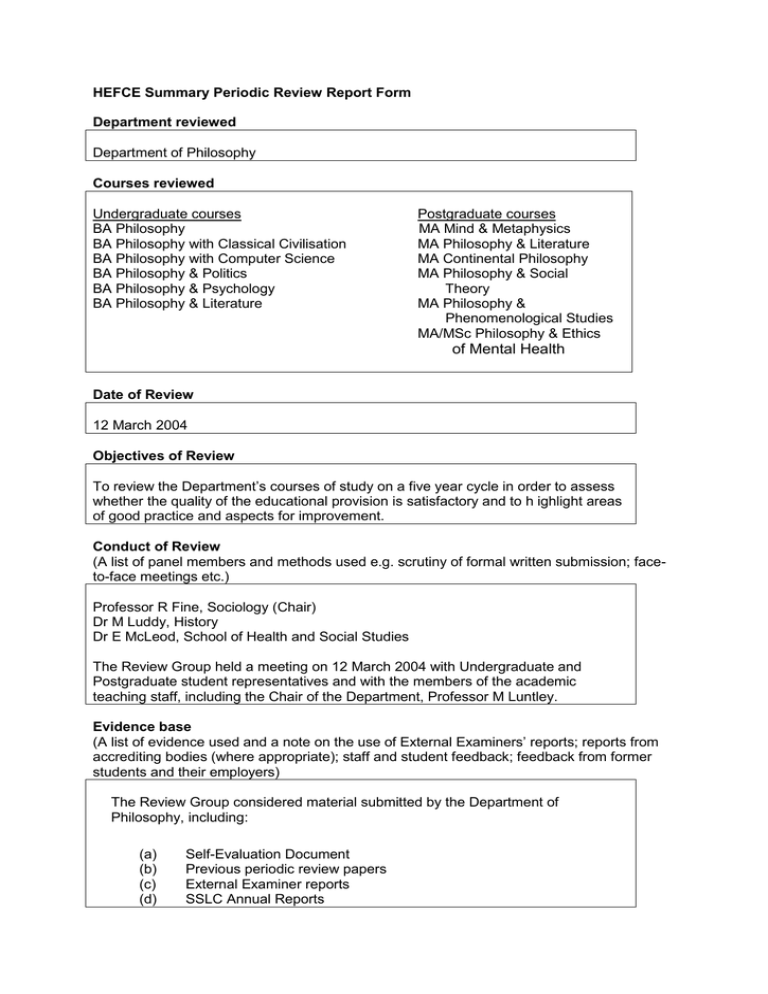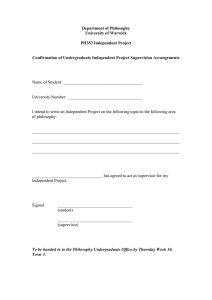HEFCE Summary Periodic Review Report Form Department reviewed Courses reviewed
advertisement

HEFCE Summary Periodic Review Report Form Department reviewed Department of Philosophy Courses reviewed Undergraduate courses BA Philosophy BA Philosophy with Classical Civilisation BA Philosophy with Computer Science BA Philosophy & Politics BA Philosophy & Psychology BA Philosophy & Literature Postgraduate courses MA Mind & Metaphysics MA Philosophy & Literature MA Continental Philosophy MA Philosophy & Social Theory MA Philosophy & Phenomenological Studies MA/MSc Philosophy & Ethics of Mental Health Date of Review 12 March 2004 Objectives of Review To review the Department’s courses of study on a five year cycle in order to assess whether the quality of the educational provision is satisfactory and to h ighlight areas of good practice and aspects for improvement. Conduct of Review (A list of panel members and methods used e.g. scrutiny of formal written submission; faceto-face meetings etc.) Professor R Fine, Sociology (Chair) Dr M Luddy, History Dr E McLeod, School of Health and Social Studies The Review Group held a meeting on 12 March 2004 with Undergraduate and Postgraduate student representatives and with the members of the academic teaching staff, including the Chair of the Department, Professor M Luntley. Evidence base (A list of evidence used and a note on the use of External Examiners’ reports; reports from accrediting bodies (where appropriate); staff and student feedback; feedback from former students and their employers) The Review Group considered material submitted by the Department of Philosophy, including: (a) (b) (c) (d) Self-Evaluation Document Previous periodic review papers External Examiner reports SSLC Annual Reports (e) (f) (g) Course Specifications Subject Benchmark Statement Undergraduate course handbooks Feedback from employers was not sought, however a number of former undergraduate students (now studying on postgraduate courses within the department) were seen by the Review Group. Contribution from external peers (Their selection; role and involvement) External input was provided by Professor D Bell from the Department of Philosophy, University of Sheffield, who attended the review and commented on a draft report. Professor Bell had been the department’s external examiner; he was selected by the Department and approved by the Chair of the Review Group. Main characteristics of the courses covered by the Review (The Review panel’s view of the content and approach of the courses under review including notable strengths) The Review commented favourably upon the Department’s courses, noting that external examiners’ reports were generally very positive, citing in particular the excellence of the teaching and the Department’s responsiveness to suggestions. On the Undergraduate side, the Review observed that the introduction of the new BA Philosophy, Politics, and Economics (PPE) would require careful monitoring, particularly in the joint supervisory arrangements between departments. The Review noted critically that the Department needed to monitor careers advice provision more closely and track more effectively the destinations of its graduates. On postgraduate provision, the Review focused critically upon the Department’s responsiveness to the new funding arrangements for postgraduate study and strategic plans for recruitment. The Review was particularly impressed by the Department’s excellent monitoring regime for doctoral student progress. Conclusions on innovation and good practice (Identification of aspects of the courses which are particularly innovative or represent good practice) The Review commended the Department for its innovative arrangements for the subclassification of first-class degrees into three grades. The Review noted that the Department’s Staff-Student Liaison Committees appear to be particularly effective, though the Review questioned whether the number of SSLCs could be rationalised and reduced. The Annual Joint Review of joint majors was regarded by the Review as an especially effective mechanism and an example of good practice. Conclusions on quality and practice (Whether the course specification is being delivered; students are achieving the intended learning outcomes and whether quality and standards are being achieved) Uniformly the Review concluded that the Department’s courses are achieving the intended outcomes and maintaining a very high standard of teaching quality. The Review did register some UG student concerns about the number of required/core modules. Conclusions on the courses (Their continuing currency and validity in the light of developing knowledge, practice in its application and developments in teaching and learning) The Review congratulated the department’s development of the MA/MSc Philosophy & Ethics of Mental Health as a particularly innovative response to developing knowledge. The new BA PPE was also welcomed as a timely innovation. The Review noted the Department’s admission that it had not recently conducted a systematic review of teaching practices to buttress the informal sharing of practices that already take place, and the Review endorsed the need for such a review given recent developments in pedagogy. Recommendations for action (Recommendations to remedy any identified shortcomings and to enhance quality and standards; areas for commendation and improvement and an indication of the significance and urgency of recommendations) The Department may wish to consider the advisability/desirability of the following: General Adopting anonymous marking procedures for assessed written work, in line with University recommendation. Conducting a systematic review of teaching practices to buttress the informal sharing of practices that already take place, as the Department suggested in its self-evaluation document. Undergraduate Provision Keeping the recent curriculum changes under review, with special attention to student satisfaction with core modules’ requirements, given the desire demonstrated by students and the external reviewer for greater optionality. Providing an orientation session for second-year students, or at least improving the sign-posting for student options, especially for joint-degree course students. Reconsidering the general essay paper option and consider requiring a dissertation (long) essay from all undergraduate students. Postgraduate Provision Developing as a matter of priority its strategic review at Departmental level of postgraduate course provision to provide the coverage expected by the new AHRB (AHRC) requirements. Enhancing the subject specific training for postgraduate teaching assistants to supplement the training provided by the Centre for Academic Practice. Expanding the travel budget available for postgraduate students and reviewing the Department’s IT provision. University of Warwick Department of Philosophy - Periodic Review, 12 March 2004 Departmental Response 1. The Department of Philosophy has received and considered the Report of the Periodic Review Panel of the Board of the Faculty of Social Studies. We are grateful for the care and precision with which the review was conducted. 2. There is just one issue in the report which we think is contestable. It is reported at §7 (a) (v) that computers dedicated for p/g students are too old and unreliable. It is unclear to us which computers are at issue here. There is a computer room within the Department well equipped with recent computers. These machines are not the responsibility of the Department. We have recently replaced old PCs within the rooms used by teaching assistants within the Department. The replacements are not latest machines, but none are more that 3 or 4 years old. The remark, attributed to a student, that they had assumed 'all of the student computers were broken' is not supported. 3. With regard to the Review Panel's conclusions and recommendations we note: (i) We will pursue this matter with our SSLCs. We note however, that our u/g representative at staff meetings is already appointed at the annual composite u/g SSLC. (ii) We will adopt this recommendation w.e.f. the next academic year. (iii) Accepted. (iv) We intend to devote a staff meeting in the new session to beginning the process of a systematic review of teaching practices. (v) Accepted. (vi) Accepted. We intend to organise orientation sessions with course convenors starting next academic session. (vii) The consideration of the general essay paper option and current optional status of the dissertation for single honours students will be returned to next session. We postponed resolution of these matters in the current session in order to complete our review of other u/g curriculum issues. (viii) Accepted. We are currently preparing draft outline plans with a view to submission of any changes to Faculty Board in autumn term 2004. (ix) Agreed. (x) Agreed. This is something we used to provide before relying on the provision of centralised training from CAP. (xi) Travel budget recommendation - agreed. IT provision for p/g - see point at 2 above. Michael Luntley 5 May 2004


